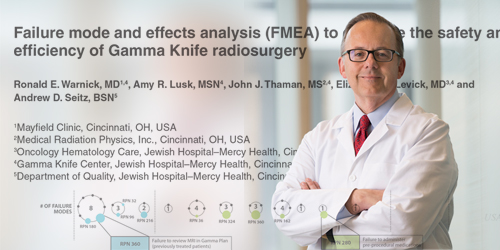By Dr. Ronald Warnick
Gamma Knife radiosurgery is well established as a targeted treatment for brain tumor patients, using 192 beams of radiation that intersect at a single point with an accuracy of 0.3 millimeters. Radiosurgery is a complex, multistep procedure that requires a high level of dedication to quality and safety. To maintain those high standards, we have turned to a time-tested, 70-year-old method of analysis.

At the Gamma Knife Center at The Jewish Hospital – Mercy Health, we launched and completed a rigorous self-analysis to reduce errors, standardize processes and protect patients. Our goal was to make sure we were taking every possible step to ensure the safety and reliability of the care we provide, even as we constantly innovate to create better solutions for our patients.
To ensure a safe and secure future for our patients, we looked to the past, specifically to an analytical tool developed by the Defense Department in 1949. Called Failure Mode and Effects Analysis (FMEA), it has been used in industries ranging from aerospace to automotive. We adapted the program specifically for the Gamma Knife Center – creating a multidisciplinary team, segmenting the processes from scheduling to the post-procedure visit and isolating the potential for errors at each step.
Why go to all of this effort? Across the nation, the Nuclear Regulatory Commission had recorded seven critical medical events at other Gamma Knife centers during the five-year period prior to our project, pointing to the need for a more in-depth safety analysis. We knew it was the right thing to do.
We identified 10 high-risk areas, including medications, imaging, radiation planning and documentation. We then developed prevention strategies for each area, including mandatory pauses and time-out documents. Eighteen months later, we have significantly reduced the risk of an undetected medical error during a Gamma Knife procedure. Last year, we published the results of our quality improvement program in the Journal of Radiosurgery and SBRT. We believe our process can function as a roadmap for other Gamma Knife centers to enhance the quality of stereotactic radiosurgery nationally.
I also serve on the Novalis Circle Expert Panel. This international panel of distinguished radiosurgeons and medical physicists manages the Novalis Certified program, the independent certification to ensure safety and quality in stereotactic radiosurgery. The Novalis Certified standards are helping to define the future of health care by becoming the gold standard for evidence-based analysis, evaluation and improvement. For example, the certification process includes extensive offsite document reviews and onsite visits that form the basis for a report covering 77 individual standards of care.
The most successful health care organizations will live in a state of constant disruption and transformation, anchored by a culture of self-improvement and a commitment to specialized procedures, workflows and collaboration to promote the highest standards of quality and safety. This is the future of health care and our foundational responsibility as health care providers, to design and transform our technology and process into a program of quality care that places the patient at its core.
Dr. Ronald Warnick has been a neurosurgeon at Mayfield Brain & Spine since 1991. He is co-director of the Gamma Knife Center at The Jewish Hospital – Mercy Health and also performs stereotactic radiosurgery at TriHealth and The Christ Hospital Health Network. He serves on the board of the International Radiosurgery Research Foundation and the Novalis Circle Expert Panel.